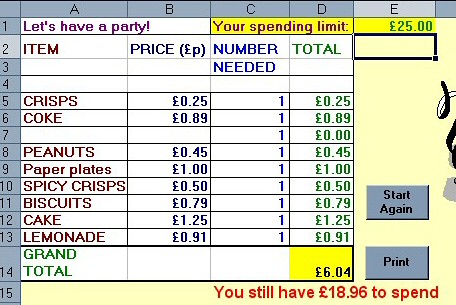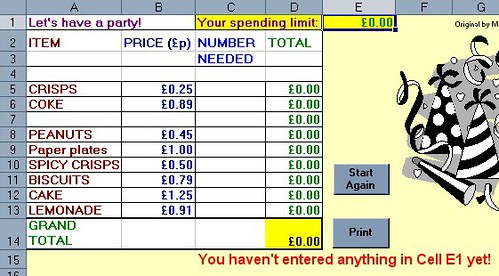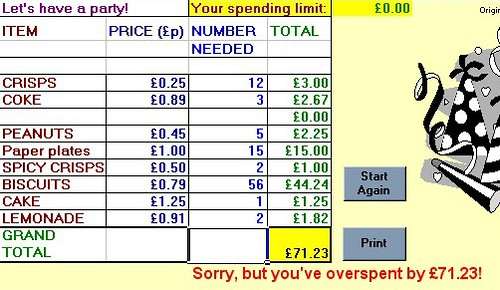You can just imagine the family rows of the future, should technology ever reach the point where it isn't possible to distinguish between humans and non-humans merely by looking at them.
Read MoreWould you have sex with a robot?
 Can you envisage a time when human beings will have relationships with robots? You could argue that to some extent we already have a relationship with electronic things (in my case, a love-hate relationship!), but can you imagine a time when we might marry robots, or have sex with them?
Can you envisage a time when human beings will have relationships with robots? You could argue that to some extent we already have a relationship with electronic things (in my case, a love-hate relationship!), but can you imagine a time when we might marry robots, or have sex with them?
Out of this world
 It’s August in Britain, and it’s raining. In fact, I was reading today that the Meteorological Office has issued a severe weather warning for the South-East of England! So, a typical British summer in other words. What better time, if you’re still enjoying the school holidays, to visit an exhibition or two?
It’s August in Britain, and it’s raining. In fact, I was reading today that the Meteorological Office has issued a severe weather warning for the South-East of England! So, a typical British summer in other words. What better time, if you’re still enjoying the school holidays, to visit an exhibition or two?
Why Teach Spreadsheets?
I often read blogs or articles which allude to the exciting nature of the possibilities of using video and podcasting in the curriculum, as opposed to spreadsheets. I think this raises a number of issues:
Firstly, why even bother to teach spreadsheets given the apparently more exciting possibilities offered by video and so on?
Secondly, is it true to say that spreadsheets are, in their very nature, boring?
Thirdly, even if they are, does it matter?
Why teach spreadsheets?
The short answer is that you don't have to. According to England and Wales' National Curriculum Programme of Study for ICT, you have to teach modelling and sequencing. You could certainly teach the latter through a curriculum centred on podcasting and other media. You could probably teach modelling too, but it would need to be thought through very carefully in order to avoid the danger of it's becoming too superficial.
Spreadsheets, however, are ideally suited to the teaching of modelling because that's exactly what they're designed to do. If you take the basic modelling question as being "What if?", using spreadsheets is, to coin an expression, a no-brainer.
But is it not the case that for spreadsheets to be useful, lots of numbers have to be involved? Well, not necessarily. I read some years ago an article by a teacher who was using spreadsheets in English to demonstrate the progression of a work of literature over time.
If, for example, you take a novel such as The Picture of Dorian Gray, you could plot the number of witticisms per chapter in a spreadsheet and then generate a graph showing how they decline as the book progresses.
Or you could take a work by Shakespeare and plot the number of jokes per scene alongside the number of killings per scene, the instances of dramatic irony per scene and anything else of interest, and then look at the resulting graph.
What that sort of thing will do is illustrate very effectively how the nature of the play or novel changes from start to finish, but it's not the only possibility. At the Online Information conference I attended in 2008 someone showed a screenshot from someone's MA thesis in which the student had used Excel to showcase the different kinds of rhyme in English poetry.
These are good examples of modelling, but you don't have to be quite so avant guard. There are lots of opportunities for modelling of the number-crunching kind, but I'll come on to those in a moment.
Let's not forget sequencing. Contrary to what some people have said, control hasn't so much disappeared from the curriculum as morphed into "sequencing", a much better term because it's more accurately descriptive and also wider in scope:
[Pupils should be able to ... ]use ICT to make things happen by planning, testing and modifying a sequence of instructions, recognising where a group of instructions needs repeating, and automating frequently used processes by constructing efficient procedures that are fit for purpose
That's exactly the kind of thing that spreadsheets are good for, which is why I decided to approach my chapter on sequencing in the latest ICT for Life (for Year 8, ie 13 year olds) through the use of a spreadsheet. It makes use of the IF function, which can be seen as a rudimentary example of sequencing, and macros, which encapsulate both sequencing and automation.
It seems to me that if you're going to decide to teach these skills through, say, video podcasting, you will have a tough time ensuring that the work is demanding enough to meet the criteria of the National Curriculum in a real, as opposed to superficial, sense.
For example, I think that it involves more than deciding on who in the class is doing what, and in what order, and then going out with a pocket camcorder and hoping for the best. You'd need to think of things like editing, which could address both sequencing and modelling, and even issues like background music (which can affect audience reactions and assumptions) as part of the attention to modelling. But, not being an expert in such matters, I think all that sounds more challenging than coming up with a good idea centred on the use of spreadsheet.
Are spreadsheets intrinsically boring?
I think if you regard a spreadsheet as little more than a glorified calculator then you would be hard put to find much of interest there. But there are two sides to the question of whether spreadsheets are boring.
Firstly, it's a matter of functionality. In a fully-featured spreadsheet like Excel, there are all sorts of ways in which you can approach "what if?" questions, from the relatively simple IF function, through conditional formatting and scenarios, to goal-seeking and pivot tables.
Secondly, and more importantly I think, is what you do with them. Over a decade ago I devised a spreadsheet which was quite complex behind the scenes, but easy to use. It was a party planner, and what you had to do was decide how many bottles of fizzy drink and so on you should buy. The rules were that you were not allowed to overspend or underspend (the spreadsheet would alert you if you did), and you had to buy everything on the list.
 Information is provided in real-time...
Information is provided in real-time...
Obviously very simple, but put the students to work in pairs and discuss their purchases and it starts to take on a life of its own. It is actually quite hard to spend exactly a given amount of money without resorting to desperate measures like buying 200 bags of peanuts and nothing else!
Then you can start to throw in "curved balls", such as:
"Sorry, class, but I've just found out that your dad couldn't work overtime this week, so you can only spend £25 instead of £40." Or:
"Hey, I just found out that some of the people coming along are vegetarian, so make sure you buy something they can eat and drink too."
As a homework exercise beforehand you can ask them to do some research into what sorts of tings people buy for parties, and part of the lesson can involve getting onto the internet to try and find the lowest prices.
So, in a sense, the spreadsheet itself is boring: after all, all the pupils are doing is entering numbers because everything has been set up for them. But they're starting to learn what modelling is, in a way that is interesting to them.
But where this sort of approach really starts to take off is afterwards, when you say, in effect, OK, let's take the lid off and see how this thing works. You can ask the pupils, what do you think is actually happening behind the scenes to give you a message like "Sorry, but you have overspent by £14.16."?
The idea is to get them to understand the logic of what is happening, expressed in ordinary language. Once that's been achieved, you can start to construct a spreadsheet model using syntax that the spreadsheet program will understand.
If your spreadsheet work consists of (and I've seen this) getting the pupils to type in rows and rows of football scores and then find the average score and the highest score, then I agree with you: that is mind-numblingly boring. It's tedious, pointless (why not give them an already-populated spreadsheet?) and mundane.
With older students you can push the boat out a bit further. We're accustomed to spreadsheet models being concerned with business or sports, but how about science fiction for a change?
In The Cold Equations, Tom Godwin posits the idea of a supply spaceship that has almost precisely the right amount of fuel for its return journey, taking into account weight and distance. What happens when the pilot discovers a stowaway on board? I won't spoil the story for you by telling you (read it, especially if part of your job is to discuss moral issues with your students), but what a great starting point for a spreadsheet exercise! Can you construct a simple model showing what happens to fuel consumption when one of the critical factors (weight or distance) goes over a certain limit?
Again, this activity can be enriched by asking the pupils to do research into this area -- not necessarily in the area of space flight, but in the more accessible realm of fuel consumption by cars.
Even if spreadsheet are boring, does it matter?
I thought I'd throw this one in. I do think it matters, up to a point, which is why I wrote the book "Go on: bore 'em: how to make ICT lessons excruciatingly dull". However, I do think there is a danger of falling into the trap of thinking that school has to be entertaining all the time. It's a fact of life that some activities are boring, but possibly necessary.
What springs immediately to my mind is preparing my invoices. I love the work I do, and when I finish one assignment I like to move on to the next. Instead, I have to find time to sort out the paperwork and get an invoice sent off to the client. That's just plain boring as far as I'm concerned. But if I didn't do it, we wouldn't eat!
I'm not suggesting that we try and bore kids as part of their preparation for adult life! But neither do I think we should tear our hair out and rent our clothes if school activities are not always as action-packed and fun-filled as kids would often have us believe they want them to be.
In fact, it's a con on their part, perhaps an inadvertent one. What kids want at school is not necessarily to be entertained, but to be kept interested, and to feel that they're learning something useful. Spreadsheets have the potential to form the basis of activities that help to achieve exactly those goals.
This is an updated version of an article that was first published on 24th December 2008.
Robot rights
"I will NOT have any daughter of mine bringing a robot into this house!"
You can just imagine the family rows of the future, should technology ever reach the point where it isn't possible to distinguish between humans and non-humans merely by looking at them.

And what of the ethnic monitoring forms of the future? Will employers have to ensure that a certain percentage of its workforce is non-human? An ethnic monitoring form of the future?
An article in the Daily Telegraph reports that people have already started to think about such matters:
"Society must decide if it is willing to accept relationships between humans and robots before the machines become so sophisticated they start demanding rights, a legal expert has warned."
I recall reading a short story some years ago in which a person discovers that they're not human, but a robot, and has to leave his job because of antagonism which I suppose would be classified as 'robotism'. It gives grist to my mill that, as I argued recently, science fiction can be a great starting point for discussion in a whole range of areas.
Furthermore, as this story in the Telegraph shows, the pace of technological change is such that we cannot assume that just because something is still confined to the fiction area of the bookshop it is not worth thinking about for its implications in actuality.
What Anna Russel, the legal expert referred to, has done is to extrapolate from current technological developments to potential problems for the future. This kind of exercise can be quite useful in getting students to think about the (possible) effects of technology on society, which is part of the National Curriculum in England and Wales and the curriculum of other countries.
Shock tactics: 7 ideas for teaching with technology
Shock tactics
One of the hazards of teaching youngsters about educational technology -- well, any subject I suppose -- is that it's all too easy to become predictable.
What's a database for? Storing data. Yawn. What's a spreadsheet for? Modelling. Snooze. Yes, I know that we have to address such things -- indeed, would be failing in our obligations if we didn't -- but sometimes it does a lot of good to be a little 'left field' about it all, where possible.
Here are some ideas.
1. Look out for modern dress productions of Shakespeare
One of the best I've ever seen was a production of Julius Caesar. There were many fine moments in it, but the two which really stood out for me were the following:
In Act 1 Scene 2, Cassius says to Casca,
"Will you sup with me tonight, Casca?",
to which Casca replies,
"No, I am promised forth."
I the production I referred to, Casca didn't answer straight away. Instead, he reached into his pocket and pulled out a PDA, flipped it open, checked it for a few seconds, closed it, and put it away, and then said,
"No."
"I am promised forth."
Marvellous! Needless to say, the audience laughed its collective head off.
Later in the play, the action takes place in Mark Antony's camp. In this production, as the curtains draw apart we saw someone putting sheets of paper through a shredding machine. From an Eng Lit point of view this is wonderful, because it sows a few seeds of doubt in the audience's mind: what's being shredded, and why? Is Mark Anthony as squeaky clean as we were perhaps led to believe?
A very good film is Ian McKellan's Richard The Third, in which the first scene opens with a tickertape being transmitted. There's a discussion about technology in itself. If you teach modern history and you want to convey what Hitler's Germany was like, or a Citizenship teacher wanting to discuss ethics and loyalty, you could do a lot worse than show this film.
2. Bring old stories up to date
Similar to the first idea, this is all about getting the class to think about how modern technology would have been used by historical figures.
A good one I tried once was about Jesus. Instead of preaching the Sermon on the Mount, perhaps he'd have used YouTube. What difficulties might he have faced (a) getting his message across to as many people as possible, and (b) being believed?
Once you start to look at these things in a modern setting, the ideas, and even the language, seem less remote. In this way, focusing on modern technology can help to make subjects like history and Religious Education more comprehendible.
3. Look for alternative ways of presenting concepts
For example, I love this spreadsheet poem.
It's another way of getting the pupils to think about mathematical relationships. You could ask them to work out the relationships for themselves, before showing them the poem. You could devise a much simpler one, and then ask them to do the same.
4. Use technology to help you see things in different ways
I witnessed a very effective art lesson (for teachers) once, in which the tutor gave out digital cameras and instructed the teachers to go out and take pictures of textures. "Get right up close and personal", he told them. And they did: close-ups of brickwork and carpet tiles, to mention just two, were enough to stimulate discussion about texture, pattern, colours and shadows.
5. Use your imagination
Or rather, get the students to use theirs. How could a writer make use of a handheld camcorder, for example? Or, turning this idea on its head, what yet-to-be-invented gadget would be a real boon to an author?
You don't have to know the answers to such questions, because the important thing is the discussion and presentation which ensue.
6. Get reading
In the current issue of The Author, the Society of Author's magazine, there is an article about the use of historical fiction in the teaching of history:
"Rebecca Sullivan, CEO of the Historical Association, a charity that exists to promote and support the study and teaching of history at all levels, [said] 'Fiction can engage pupils and open them to more thought and study. Teachers use historical fiction because it improves historical understanding in pupils.'"
How much use of fiction do teachers of ICT use? There are some rich pickings, such as:
The dialogue between the astronaut and Hal, the all-powerful computer, in 2001: A Space Odyssey
The marvellous piece from Asimov, The Machine That Won the War
The Cold Equations by Tom Godwin
Flowers For Algernon, by Daniel Keys,
And last but not least, the brilliant news flash, 'Time travel is possible'
These stories can be great starting points for discussion, not only in the educational technology classroom, but for other subjects too.
7. Designing the classroom
Finally, a nice activity is a project in which pupils, working in groups, have to analyse the classroom and come up with ways in which it could be enhanced with technology. Part of that will have to include any refurbishments which may be necessary to accommodate the changes (such as a storage facility for a class set of mp3 recorders).
Needless to say, groups should present their findings and ideas to the rest of the class and even, if there's a particularly mouth-watering idea, to the Principal.
The thing that all of these ideas have in common is that they stray from the 'norm', and that gives them a bit of a punch.
What 'outside the box' ideas have you used to teach technology, or with technology?
If you enjoyed reading this article, you will probably find this one useful too:



